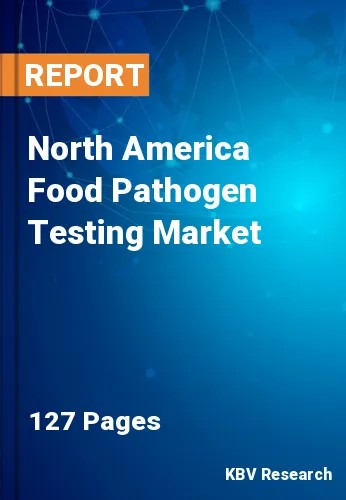The North America Food Pathogen Testing Market would witness market growth of 6.8% CAGR during the forecast period (2023-2030).
Rapid food pathogen testing methods have emerged as a game-changer in the food industry, revolutionizing how manufacturers ensure their products' safety. Unlike traditional testing methods that can take days to produce results, rapid testing offers the advantage of providing actionable information within hours. This accelerated turnaround time is instrumental in facilitating swift decision-making and enabling immediate responses to potential contamination events.
One key example of the significance of rapid pathogen testing is its role in preventing foodborne illness outbreaks. When pathogens like salmonella or E. coli are detected in a food production facility, traditional testing methods may require the facility to halt production and wait for results, leading to significant financial losses and, more critically, the continued production of contaminated products. In contrast, rapid testing allows for quick identifying pathogens, enabling companies to isolate affected batches, recall products, and sanitize equipment promptly.
Moreover, the ability to conduct on-site rapid testing is a powerful asset. For instance, portable PCR devices can be used directly in food processing facilities or at various sites along the supply chain, such as farms, distribution centers, or restaurants. This real-time testing capability reduces the need for sample transportation, minimizes delays, and enhances the efficiency of food safety protocols. Rapid testing methods can also be tailored to specific pathogens or contaminants. For instance, if a particular type of lettuce is linked to a foodborne illness outbreak, rapid testing can be employed to focus exclusively on detecting the suspected pathogen. This targeted approach saves time, resources, and laboratory capacity.
Even though the American food supply is among the cleanest in the world, the federal government assessed that there are roughly 48 million cases of foodborne sickness per year. According to this projection, 1 in 6 Americans will get sick from eating contaminated food, which will cause 128,000 hospital admissions and 3,000 fatalities. Canada, like other countries, faces foodborne illness outbreaks caused by pathogens such as Salmonella, E. coli, and Listeria. These incidents have heightened concerns about food safety and increased demand for pathogen testing to prevent contamination and protect public health. More than 4 million Canadians contract food poisoning each year, according to the Canadian government. These factors will all contribute to increased demand in North America.
The US market dominated the North America Food Pathogen Testing Market by Country in 2022 and would continue to be a dominant market till 2030; thereby, achieving a market value of $5,928 million by 2030. The Canada market is poised to grow at a CAGR of 9.2% during (2023 - 2030). Additionally, The Mexico market would witness a CAGR of 8.2% during (2023 - 2030).
Based on Technology, the market is segmented into Rapid, and Traditional. Based on Type, the market is segmented into Salmonella, E.Coli, Listeria, Campylobacter, and Others. Based on Food Tested, the market is segmented into Meat & Poultry, Fish & Seafood, Dairy, Processed Food, Fruits & Vegetables, Cereals & Grains, and Others. Based on countries, the market is segmented into U.S., Mexico, Canada, and Rest of North America.
Free Valuable Insights: The Worldwide Food Pathogen Testing Market is Projected to reach USD 26 Billion by 2030, at a CAGR of 8.2%
The market research report covers the analysis of key stakeholders of the market. Key companies profiled in the report include SGS S.A., Bureau Veritas S.A., Eurofins Scientific SE, Intertek Group PLC, TÜV Nord Group, ALS Limited, Microbac Laboratories, Inc., AsureQuality Limited, Mérieux NutriSciences Corporation, and JBT Corporation.
By Technology
By Type
By Food Tested
By Country
Our team of dedicated experts can provide you with attractive expansion opportunities for your business.

